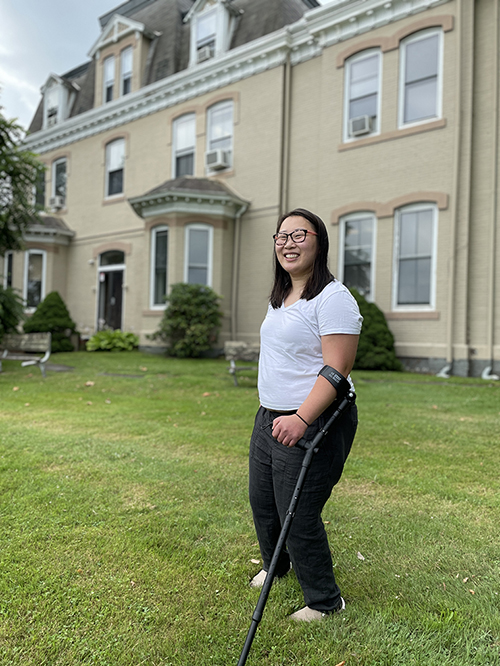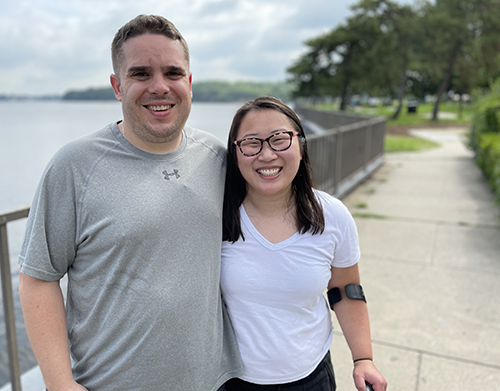Peers helping peers at the Riverbank Self-Help Center
Five years ago, Jaime Hooker needed help. She’d struggled for a long time with depression and anxiety, caused in part by bullies who tormented her through childhood because of her cerebral palsy. If she wanted to feel better, she knew she needed to move somewhere with more mental health services and better public transportation than rural upstate New York, where she lived.
So she moved to New Jersey for a fresh start in 2016. A few Google searches later, she found Catholic Charities’ Riverbank Self-Help Center, located in a historic mansion just steps from a postcard-pretty stretch of the Delaware River in Burlington.
“At first, I checked it out, and I didn’t feel it was for me. So I left,” she said. But a few years later, she trained to become a peer specialist, which is a professional with lived mental health experience who helps and encourages others in earlier stages of their wellness journeys. When a job opportunity at the Riverbank Self-Help Center arose, she took it, becoming a peer facilitator and leading discussions and support groups there. It was only after she began working at Riverbank that she realized many of its services would benefit her too.
“The way I became a client was backwards,” she said with a laugh.
All Riverbank services are intended to help people with behavioral health challenges live successfully and independently in the community. In the Supported Employment program, clients learn how to build resumes, practice interviewing, and otherwise land jobs. Riverbank’s transportation program provides rides within Burlington County to ensure clients can get to and from their jobs, while Roads to Recovery provides clients with safe transportation to anonymous recovery meetings. Support groups tackle subjects as varied as wellness recovery action planning, finance management, and coping skills for anxiety, depression, and other mental illnesses. Riverbank organizes free recreational and cultural outings, providing clients an opportunity to attend events that otherwise might be inaccessible to them. Yoga, tai chi and other opportunities for movement are also taught on-site to further promote wellness.
“Most services here are client-run, so it’s peers helping peers,” said Cindy Gambrill, Riverbank’s program coordinator. That means, for example, that clients staff the transportation program as drivers, delivering other clients where they need to go. And peers run most of the support groups.
“That’s a really effective way to provide services because peers have a unique understanding of the feelings and behaviors people who struggle with mental illness face,” Cindy Gambrill said. “Trained peer providers can also lead groups on evidence-based practices such as Cognitive Behavioral Therapy, Dialectic Behavior Therapy, coping with trauma, and hearing voices.”
Living the dream
Jaime used the employment services, which helped her land a second job in case management at an area nonprofit that serves people with disabilities. “There had been big gaps in my employment history due to having mental illness and struggling, so that was a really big help,” she said.
She also regularly uses Riverbank’s transportation services, because she finds them cheaper and easier to schedule than public transit. “Riverbank’s transportation costs $2 a ride – anywhere (within the county) – where Uber might cost me $12, or more, depending where I go,” she said. “It really gives you peace of mind, for sure.”
Further, Riverbank offers a sense of community Jaime said she hasn’t found in other programs: “It feels so friendly and supportive, almost like a family. We all have lived experience and can share that lived experience with each other. The groups and services here have been better than what I’ve attended in hospital-based programs, because they’re coming from people who truly understand and get what it’s like, living with mental illness.”
Jaime also met her boyfriend of three years, Michael, at Riverbank. He’s a Riverbank peer facilitator too. She considers Riverbank so pivotal in her progress that she recently brought her mother, who was visiting from upstate New York, for a tour there. Looking toward her future, she jokes that she’s living her dream now.
“I had such a rough 20s,” said Jaime, who’s now 35. “I feel like these are my prime years. I’m having a good time. The Riverbank Self-Help Center has really helped me maintain my recovery and given me a sense of purpose. I feel like I owe a lot to Catholic Charities, because they really got me back on my feet and helped me reach my goal of being employed. I’m not sure I would be as successful and contented as I am today without them.”
FOR INFORMATION on the Riverbank Self-Help Center, contact Program Coordinator Cindy Gambrill at (609) 480-6845 or [email protected].
To subscribe to our blog posts and news releases, fill out the fields below.

